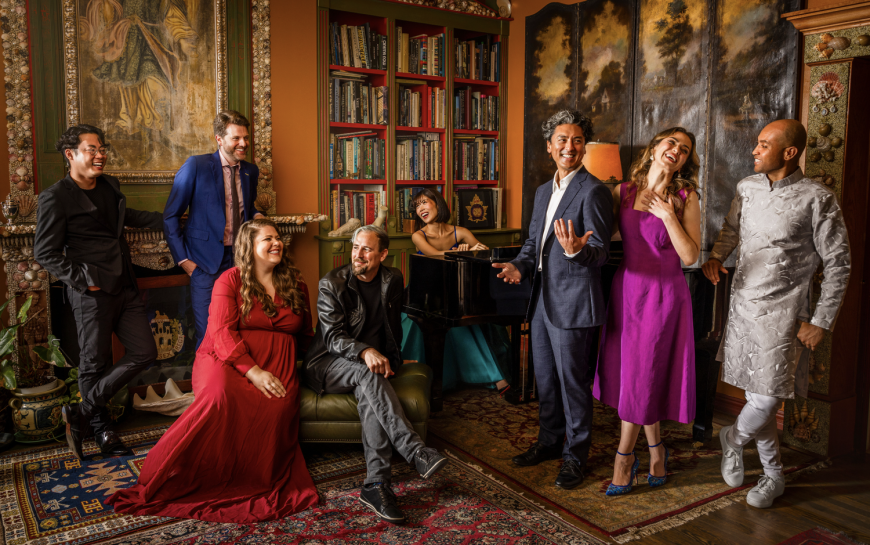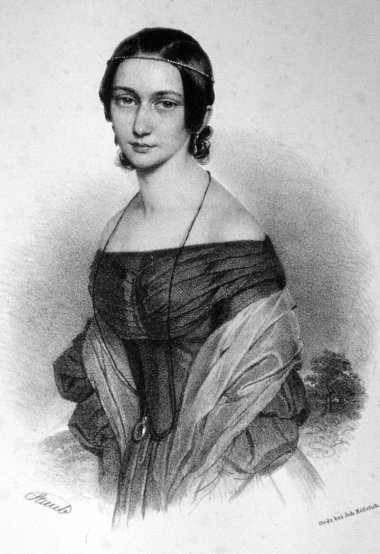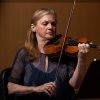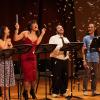
Classical music’s biggest crisis isn’t artistic — it’s PR. We keep asking how to lure new ears to old music. On Sunday, April 27, at BroadStage, Salastina’s answer was context, concision, and Clara Schumann.
Patrons arriving early to the chamber ensemble’s 11 a.m. concert were greeted by a string quintet of student-performers from SOL-LA Music Academy, the Santa Monica nonprofit offering music instruction to all children regardless of economic background. The students’ program of classical, tango, jazz, and Broadway melodies made a convincing case for what early, equitable access can provide: strong community and great music.
KUSC’s Brian Lauritzen, resident host with Salastina, set the tone for a one-hour guided program meant to lead us through works by Clara Schumann, Johannes Brahms, Robert Schumann, and Richard Wagner. Lauritzen made the ensemble’s mission clear: context as point of entry. He asked us to note the opus numbers of the program’s selections, all written near the end of their respective composers’ careers — Clara Schumann’s Op. 22 sits dwarfed by Brahms’s Op. 118 and Robert Schumann’s Op. 94.

As a composer, Clara Schumann was at least every bit the equal of her contemporaries but found her career marginalized by attitudes toward women composers and her role as wife to Robert Schumann. In this light, Lauritzen posed the question, “What if we’d had more music from Clara?” Cellist Yoshika Masuda and pianist HyeJin Kim answered with a performance of the Andante molto from her Three Romances that was genial and intimate. At the close, there was an audible collective exhale from the audience. This opener, in its poignancy and emotional subtlety, was far and away the program’s highlight.
Next came Brahms’s Intermezzo No. 2 and Romanze from Op. 118, followed by one movement from Robert Schumann’s own Three Romances. Heard alongside Clara Schumann’s brilliant and generous music, these pieces linked easily and beautifully into the themes Lauritzen provided.
Before Wagner’s Siegfried Idyll, Lauritzen gave the well-known Wagner disclaimer — anti-Semitism, egomania, and Brahms-baiting — comparing Wagner to today’s problematic billionaires, whose products we want but politics we don’t. Salastina’s 13-player ensemble performed the sunrise fanfares and lullaby motifs with restraint, joy, and flawless technique. Yet after the taut scale of the earlier works, Wagner’s 20-minute reverie felt overlong. Whether that impression came from the score itself or listener bias is hard to untangle, but I caught myself wishing for another Clara Schumann movement instead.
The student-performers from SOL-LA were among the few young people in attendance. Inside, hair trended more gray and white. Salastina’s stated values — joy, excellence, relationships, storytelling, fun — rang true onstage, yet this demographic gap suggests the message isn’t traveling far beyond the usual circle. A format this welcoming seems ideal for younger or more diverse audiences. Finding them may be the next hurdle, not just for Salastina but for the many organizations committed to genuine outreach in the classical music sphere.
Clocking in at just over an hour, the concert proved how much substance a bite-size program can carry when contextualized with care. Clara Schumann emerged as the moral and musical center. Brahms and Robert Schumann supported the portrait. Wagner provided the ethical provocation. If some listeners left debating whether an idyll can ever outweigh its author’s faults, then so much the better. Salastina didn’t promise easy answers, only an open door. On a quiet Sunday morning, that was enough.



